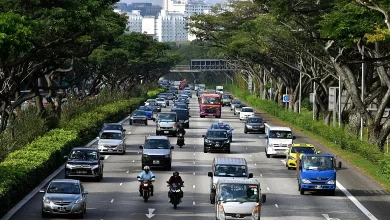Understanding Singapore’s Certificate of Entitlement (COE)
In Singapore, every vehicle must have a Certificate of Entitlement (COE) before it can be registered and driven on public roads.
The Land Transport Authority (LTA) manages the COE system under the Vehicle Quota System (VQS), which caps the number of vehicles on the road to control congestion and pollution. A COE basically lets you own and drive your vehicle for 10 years.
But let’s be honest – COE bidding can feel like a game of chance, especially when prices swing wildly from one exercise to the next. That’s where Carro New Cars comes in. We simplify the process with our 1-bid COE guarantee. Just choose your car and we’ll handle the COE for you.
Read more: What is Carro New Cars?
The five COE categories
COEs are divided into five categories based on vehicle type and engine power:
| Category | Vehicle Type | Engine Power |
| A | Non-fully electric | ≤1,600 cc and ≤97 kW |
| Fully electric | ≤110 kW | |
| B | Non-fully electric | >1,600 cc or >97 kW |
| Fully electric | >110 kW | |
| C | Goods vehicles and buses | Not based on engine size or power |
| D | Motorcycles | Not based on engine size or power |
| E | Open category | Any vehicle except motorcycles |
Categories C and E are transferable once if held by an individual, but COEs in A, B, and D cannot be transferred.
Full info can be obtained via LTA’s website.
COE bidding schedule and vehicle quotas
COEs are released through open bidding exercises held twice a month. Each exercise starts at 12pm on the first and third Monday and lasts three working days, ending at 4pm on Wednesday (unless interrupted by a public holiday).
Before each exercise, LTA announces the vehicle quota—the number of COEs available per category—based on deregistrations, allowable growth, and other adjustments under the VQS.
How to submit your COE bid
Bidders can place COE bids via:
- ATMs (for individual bidders)
- Internet banking (for corporate account holders)
Each bidder must have sufficient funds to cover the bid deposit and bank administration fee (typically $2–$10). The standard bid deposit is $10,000 for Categories A, B, C, and E. Category D deposit is currently $1,500.
How COE bidding works
When submitting a bid, you specify a reserve price—the maximum you’re willing to pay. The system starts at $1 and automatically increases in $1 increments until it reaches your reserve price or the number of bids at or above the current price equals the quota.
The current COE price (CCP) is always the highest unsuccessful bid plus $1. Bidders whose reserve prices meet or exceed the final CCP secure a COE and all pay the same Quota Premium, which is the CCP at exercise close.
Example COE calculation
Example:
- 2nd COE open bidding exercise in the month (N)
- COE quota for Category A = 3
- Number of bidders = 5, with reserve prices of $100, $88, $70, $70 and $41
- At the end of the bidding exercise, the bid status of each of the 5 bids will be as follows:
| Reserve price | Bid status | Remarks |
| $100 | Successful | Only the first 2 bids will be successful.
The COE Price (or Quota Premium) will be $71. The 3rd and 4th bids (both with reserve price of $70) are not accepted as then the number of successful bids would exceed the COE quota of 3. The remaining 1 unallocated COE quota, which is called unused quota, will be carried forward to the next corresponding COE bidding exercise in the following month (i.e. 2nd COE open bidding exercise in the month N+1). |
| $88 | Successful | |
| $70 | Unsuccessful | |
| $70 | Unsuccessful | |
| $41 | Unsuccessful |
Example from LTA’s One Motoring.
Revising COE bids and acknowledgement codes
If you’re outbid (CCP > your reserve price), you can revise your bid upwards in $1 increments as many times as you like before the exercise ends.
Each successful submission or revision generates a 6‑digit acknowledgement code, required to authenticate any further revisions. Keep this code confidential—it’s tied to your NRIC/FIN or corporate ID.
After 10 years, you can either deregister your vehicle or renew your COE by paying the prevailing quota premium (PQP). The PQP is the moving average of Quota Premiums over the last three months (excluding months with no bidding) and varies monthly. Renewal periods differ by category, with 5‑ or 10‑year options available.
Tips for successful COE bidding
- Monitor quota announcements: More quota often means lower premiums.
- Set a realistic reserve price: Use historical premium data to guide you.
- Ensure sufficient funds: Avoid failed bids due to insufficient balance.
- Bid early and revise: Submit at the start of the exercise to maximize revision opportunities.
- Be aware of the acknowledgement code: You’ll need to authenticate with this 6-digit acknowledgement code for each successful submission or revision.
You can check your bidding results here.
Once again, if this all sounds a little stressful, don’t worry. Let us handle your COE bidding with Carro New Cars.
We do the heavy lifting for you with our 1-bid COE guarantee. No confusing forms, no guessing games, and no need to keep refreshing the COE bidding page. Just pick your dream car, and we’ll secure the COE for you.
Is COE bidding really that scary?
COE bidding in Singapore might seem a bit intimidating at first, but it’s actually a fair, market-driven system that helps keep vehicle numbers in check.
Once you understand how the categories work, when to bid, and how the whole process runs, it gets much easier to make smart decisions—and avoid overpaying.
Whether you’re bidding for the first time or renewing your COE after 10 years, a little planning and smart timing can go a long way in getting the best deal.




